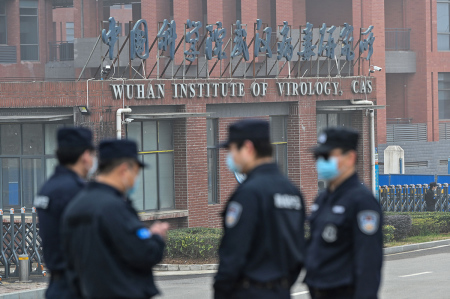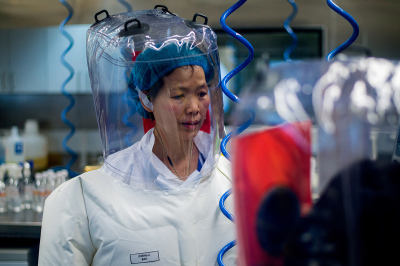HHS to investigate NIH grant program amid concerns over Wuhan lab funding

A federal agency has opened an investigation into the U.S. National Institutes of Health’s grant program for international research amid criticism over funding sent to the Wuhan Institute of Virology, the Chinese lab from which some claim the virus may have originated.
The U.S. Health and Human Services announced it would look into how NIH monitors grantees and subgrantees' use of grant funds.
"We share stakeholders’ concerns regarding compliance and oversight of NIH grant funds. We have been monitoring this issue for some time and consider it a high-priority matter that can pose a threat to the integrity of the NIH grant program," Tesia Williams, spokeswoman for Health and Human Services Office of Inspector General [OIG], said in a statement to The Hill.
"Based on our preliminary research and analysis, HHS-OIG has decided to conduct an extensive audit reviewing how NIH monitored selected grants and how the grantees and subgrantees used and managed federal funds between years 2014 through 2021,” she continued.
Fox News reports that the new investigation coincides with a period of time in which NIH gave New York-based EcoHealth Alliance $3.75 million in grant funding to carry out studies on coronavirus in bats.
Fauci admitted before Congress that EcoHealth Alliance used a nearly $600,000 subgrant from NIH to fund research at Wuhan Institute of Virology on bat coronaviruses over five years, from 2014 to 2019. However, HHS documents obtained by the conservative activist group Judicial Watch suggest that $826,277 was provided by the National Institute of Allergy and Infectious Diseases to the Chinese lab during that time.
Former President Trump terminated this contract in April 2020, arguing that he had seen evidence that the institute in Wuhan was responsible for the outbreak.
Many top Republicans and Trump blamed China for the start of the pandemic in 2020, claiming that it escaped from the premier lab for studying coronaviruses. Many dismissed the claim as a conspiracy theory. There are competing theories on how the virus originated.
Alina Chan, a Canadian scientist and postdoctoral associate at the Broad Institute of MIT and Harvard University, recently said she and her colleagues initially denied the possibility of the coronavirus originating from a lab leak because they did not want to be associated with Trump.
"At the time, it was scarier to be associated with Trump and to become a tool for racists, so people didn't want to publicly call for an investigation into lab origins," Chan told NBC News.
Chan is one of the 18 experts who signed a letter in May demanding an in-depth investigation into the virus' origins that looks into theories of natural origin and laboratory leak. However, she didn't want to call for this action at first to avoid being associated with Trump.
Harper Books announced on June 8 that Chan will co-author a book chronicling “every twist and turn” in uncovering COVID-19’s origin.

Footage from the Wuhan Institute of Virology shows live bats were kept in cages, debunking a World Health Organization claim that such an allegation was a “conspiracy,” Sky News reported.
A WHO report released in March stated the coronavirus likely emerged from bats and is “extremely unlikely” to have emerged from a laboratory leak. The report argued the virus was more likely to have spread to another animal before being contracted by humans.
A popular theory has been that COVID-19 emerged from bats in a Wuhan, China wet market.
Fox News reported that experts and lawmakers have claimed that Wuhan Institute of Virology was participating in gain-of-function research, where animal viruses are manipulated to become transmissible and harmful for humans.
Funding gain-of-function research is prohibited by Senate Amendment 2003, which defines gain-of-function as “any research project that may be reasonably anticipated to confer attributes to influenza, MERS, or SARS viruses such that the virus would have enhanced pathogenicity or transmissibility in mammals.”
National Institute of Allergy and Infectious Diseases Director Anthony Fauci and NIH Director Francis Collins have denied allegations that grant money awarded to EcoHealth Alliance was used to fund gain-of-function research in Wuhan.
Republican Sen. Tom Cotton, R-Ark., recently cited a Hudson Institute event regarding the COVID-19 origins and said evidence of a lab leak “has been building for months." He pointed to the “lax safety conditions at Wuhan Institute of Virology,” “similarities between research at the lab and features of the virus” and “patents for bat cages and other live-animal research tools filed by WIV.”
More questions surrounding the lab leak hypothesis for the COVID-19 outbreak arose when State Department documents released during the final days of the Trump administration revealed three researchers from the lab were hospitalized after becoming sick with COVID-19 symptoms in November 2019, a month before the first confirmed case.
The Senate unanimously approved a bill, introduced by Sens. Josh Hawley, R-Mo., and Mike Braun, R-Ind., on May 24 to require the federal government to declassify all information on links between the Wuhan lab and COVID-19 following the Wall Street Journal article about the three sick researchers.
In a statement in late May, President Joe Biden said that the intelligence community has “coalesced around two likely scenarios’ on the origin but has not reached a definitive conclusion on this question.” He called on the intelligence community to “redouble their efforts to collect and analyze information that could bring us closer to a definitive conclusion."
Emily Wood is a reporter for The Christian Post. She can be reached at: [email protected]





















